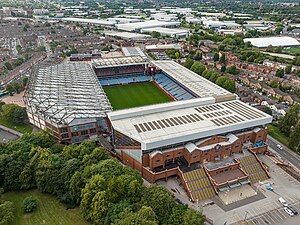 | |
 | |
| Former names | Aston Lower Grounds |
|---|---|
| Location | Trinity Road, Birmingham B6 6HE |
| Public transit | 7 and 11 bus routes[2] |
| Owner | Aston Villa |
| Operator | Aston Villa[1] |
| Capacity | 42,918[4] |
| Record attendance | 76,588 (Aston Villa vs Derby County, 2 March 1946) |
| Field size | 105 by 68 metres (114.8 yd × 74.4 yd)[4] |
| Surface | Desso GrassMaster[1] |
| Construction | |
| Broke ground | 1894 |
| Built | 1895–1897 |
| Opened | 1897[1] |
| Construction cost | £16,733 (£25 mil)[3] |
| Tenants | |
Aston Villa (1897–present)[1]
| |
Villa Park is a football stadium in Aston, Birmingham, with a seating capacity of 42,918.[4] It has been the home of Premier League club Aston Villa since 1897. The ground is less than a mile from both Witton and Aston railway stations and has hosted sixteen England internationals at senior level, the first in 1899 and the most recent in 2005. Villa Park has hosted 55 FA Cup semi-finals, more than any other stadium, and it is the 10th largest in England.
In 1897, Aston Villa moved into the Aston Lower Grounds, a sports ground in a Victorian amusement park in the former grounds of Aston Hall, a Jacobean stately home. The stadium has gone through various stages of renovation and development, resulting in the current stand configuration of the Holte End, Trinity Road Stand, North Stand and Doug Ellis Stand.
Before 1914, a cycling track ran around the perimeter of the pitch where regular cycling meetings were hosted as well as athletic events. Aside from football-related uses, the stadium has seen various concerts staged along with other sporting events including boxing matches and international rugby league and rugby union matches. In 1999, the last final of the UEFA Cup Winners' Cup took place at Villa Park. Villa Park also hosted the 2012 FA Community Shield, as Wembley Stadium was in use for the final of the Olympic football tournament.[5]
Aston Villa have plans to redevelop the North Stand: this would increase the capacity of Villa Park from just under 43,000 to 50,065. Such plans also include the construction of an accompanying commercial and entertainment venue dubbed "Villa Live".[6] In December 2022, the plans were approved by Birmingham City Council.[7] The renovations were planned to be completed by UEFA Euro 2028. However, in December 2023, President of Football Operations Chris Heck announced that the redevelopment plans had been indefinitely postponed.[8]
- ^ a b c d "Villa's plan to rebuild North Stand". Express & Star. 14 May 2010. Retrieved 11 November 2010.
- ^ "Local Bus Routes". NXBUS. Retrieved 14 July 2018.
- ^ Inglis, Simon (1997), p.84
- ^ a b c "Premier League Handbook 2024/25" (PDF). 25 July 2024. p. 8. Retrieved 4 November 2024.
- ^ "Community Shield switched to Villa Park as Wembley hosts Olympics". The Daily Telegraph. London. 18 May 2012. Archived from the original on 12 January 2022. Retrieved 1 June 2012.
- ^ "Villa Park redevelopment plans could increase seating to more than 50,000". ITV News. 15 December 2022. Retrieved 22 December 2022.
- ^ Club, Aston Villa Football (22 December 2022). "Aston Villa welcomes planning approval for Villa Park redevelopment". Aston Villa Football Club. Retrieved 22 December 2022.
- ^ Townley, John (19 December 2023). "Chris Heck delivers major Villa Park update as Aston Villa development paused". Birmingham Live. Retrieved 21 February 2024.